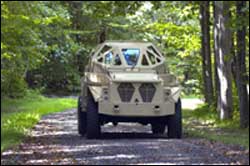Concept vehicle illustrating new options for military combat vehicles to be unveiled

The ULTRA armored patrol vehicle was developed to illustrate design and technology options for increased survivablity and mobility for future military combat vehicles vehicles.
Improving survivability and mobility
A concept vehicle designed to illustrate potential technology options for improving survivability and mobility in future military combat vehicles will be shown publicly for the first time Sept. 13-15 at a military technology meeting in Virginia.
The event, “Modern Day Marine Expo,” will be held at the Marine Corps Air Facility in Quantico, Va.
The concept vehicle, known as the ULTRA AP (Armored Patrol), was built to help the U.S. military evaluate multiple science and technology options – including ballistic and mine protection – that could benefit future vehicle design. The concept vehicle combines proven vehicle technologies with advanced materials and engineering concepts.
Research and development for the ULTRA has been conducted by the Georgia Tech Research Institute (GTRI), which led a unique team of research engineers from both GTRI and the automotive industry. The research initiative has been sponsored by the Office of Naval Research (ONR).
“By bringing together experienced commercial vehicle designers with experts in advanced materials and cutting-edge engineering, we are providing a test bed for evaluating technologies that can help the military develop true ’leap-ahead’ concepts,” said David Parekh, GTRI’s deputy director. “By including persons with high-performance automotive engineering and NASCAR expertise as part of our team, we were able to root this advanced concepts project in real-world vehicle design.”
The ULTRA AP emphasizes high-output diesel power combined with advanced armor and a fully modern chassis. The design matches the best of modern commercial automotive technology with racing experience, explained Gary Caille, a GTRI principal research engineer.
In the ULTRA AP, the GTRI/industry team has made improvements in two key areas by taking a systems approach to survivability and safety:
Survivability: This factor involves a vehicle’s ability to shield occupants from hostile action. The ULTRA AP will feature novel design concepts and research advances in lightweight and cost-effective armor to maximize capability and protection. The new armor was designed at GTRI in partnership with the Georgia Tech School of Materials Science and Engineering. The vehicle also incorporates a “blast bucket” designed to provide ballistic, blast and enhanced roll-over protection. New vehicle designs must incorporate dramatically increased resistance to explosions caused by mines and improvised explosive devices, Caille noted.
Safety with Performance: The ULTRA design explored the use of on-board computers to integrate steering, suspension and brakes to provide an unparalleled level of mobility and safety, Caille added. The new vehicle’s integrated chassis represents an advancement over the most advanced current production vehicles.
The ULTRA AP project has been supported by the Office of Naval Research (ONR) as part of its mission of investigating and assessing new technologies for military use. By providing the ULTRA AP concept vehicle for the U.S. Marine Corps and U.S. Army to study, ONR expects to spur innovative thinking and gather feedback on the ideas being demonstrated.
In developing the ULTRA AP, GTRI brought together a group of industry professionals that included Scott Badenoch, an auto industry advanced development and racing professional; Tom Moore, former Chrysler vice president of Liberty Operations, the company’s advanced engineering center; Walt Wynbelt, former program executive officer with the U.S. Army Tank Automotive and Armaments Command, and Dave McLellan, the former Corvette chief engineer for General Motors.
The ULTRA project is linked directly to “e-safety,” an emerging automotive concept that combines computers and advanced technologies to make driving safer, McLellan noted. In e-safety, night driving systems and stability control add security, while radar systems – already available in Europe – actually slow vehicles automatically under certain conditions.
Media Contact
More Information:
http://www.gtri.gatech.eduAll latest news from the category: Automotive Engineering
Automotive Engineering highlights issues related to automobile manufacturing – including vehicle parts and accessories – and the environmental impact and safety of automotive products, production facilities and manufacturing processes.
innovations-report offers stimulating reports and articles on a variety of topics ranging from automobile fuel cells, hybrid technologies, energy saving vehicles and carbon particle filters to engine and brake technologies, driving safety and assistance systems.
Newest articles

An Endless Loop: How Some Bacteria Evolve Along With the Seasons
The longest natural metagenome time series ever collected, with microbes, reveals a startling evolutionary pattern on repeat. A Microbial “Groundhog Year” in Lake Mendota Like Bill Murray in the movie…

Witness Groundbreaking Research on Achilles Tendon Recovery
Achilles tendon injuries are common but challenging to monitor during recovery due to the limitations of current imaging techniques. Researchers, led by Associate Professor Zeng Nan from the International Graduate…

Why Prevention Is Better Than Cure—A Novel Approach to Infectious Disease Outbreaks
Researchers have come up with a new way to identify more infectious variants of viruses or bacteria that start spreading in humans – including those causing flu, COVID, whooping cough…



